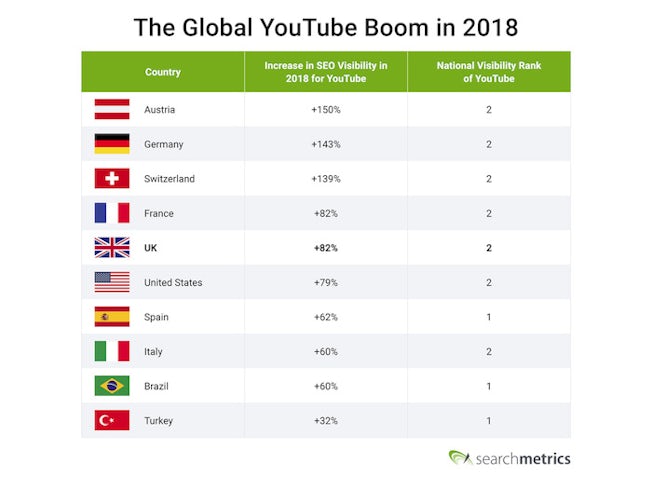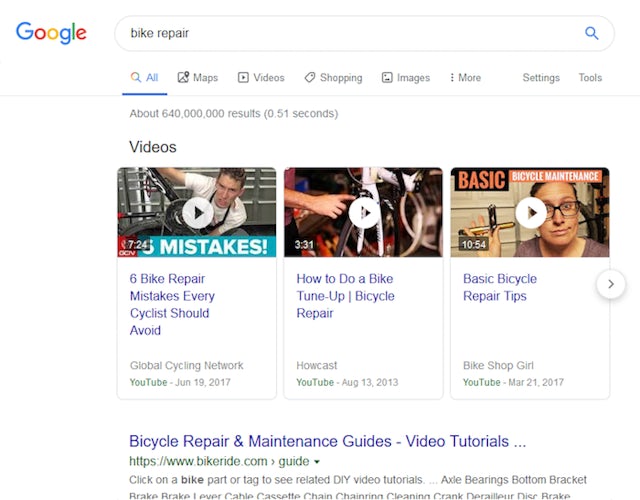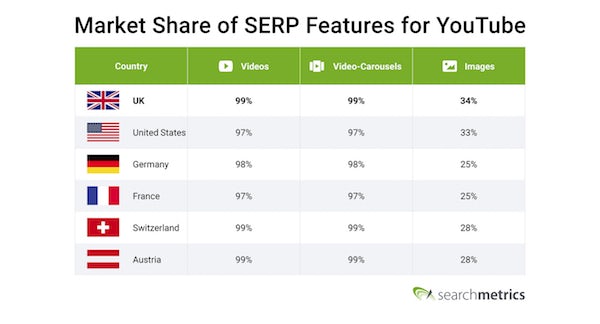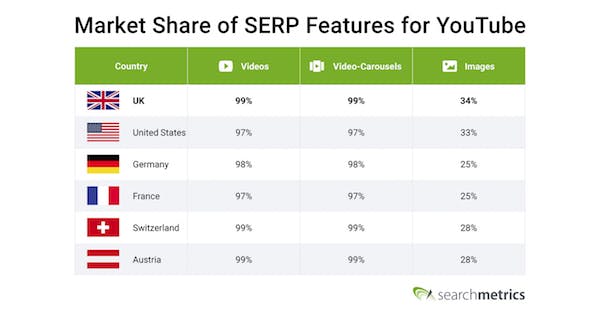For example, last year, YouTube, according to Searchmetrics data, was the second most visible website in Google’s search results globally, based on its performance in organic search in ten countries, including the United States, UK, Germany and France (see chart underneath). YouTube ranks second for search visibility in seven Google Country Indexes (behind only Wikipedia).
It has also clocked up the biggest absolute improvements in search performance over the twelve months of last year in each of the ten regions. For example, its search visibility increased by 79% in the US and by 82% in the UK.

These improvements are partly down to the major Google Update in June 2018 which saw video carousels being displayed in the desktop search results instead of the classic individual video snippet thumbnails. The new format consists of a horizontally scrollable carousel with ten relevant videos per search result – three of them are immediately visible, the rest coming into view on scrolling. Since introducing carousels, Google shows fewer classic individual video thumbnails. Carousels are now displayed for around half of all Google searches.

YouTube vs. competitive video platforms in SERP features
It’s also worth emphasising that when Google wants to display video in search results, it invariably chooses content from YouTube rather than competitive video platforms. This becomes very clear if you analyse the make-up of Google’s SERP (search engine results page) features.
SERP features are the integrations and widgets appearing in the search results pages that are not the ten traditional organic results. The SERP features that are relevant here are the “classic” video snippets boxes, the video carousels and the images that Google displays in a separate widget on the page.
The Searchmetrics analysis underneath shows that when a video snippet or video carousel is featured in the search results page, YouTube has 97% and 99% market share. So competitive video platforms can only muster a maximum of 2 to 3%. And even when Google displays an image integration on the page, YouTube accounts for 25 to 33% of these images – primarily with the thumbnails from the video preview.

What’s the future for YouTube?
It seems likely that people’s appetite for consuming video online will continue to grow. A 2018 study by Cisco suggests that the video will account for 82% of all internet traffic by 2022, by which time nearly half of all devices and connections will be video-capable.
It remains to be seen, however, if YouTube will continue to be the undisputed leader. It does face some threats, one of which is the trend towards high-format (vertical) videos. This format, which is used by Instagram, works especially well on smartphones because you can watch videos on the full screen by default. On YouTube videos are in widescreen format which means you need to turn your phone horizontally to watch in full screen mode.
The other question is whether YouTube can grow and evolve, especially in the paid-for video streaming arena. YouTube Premium offers an ad-free offer with exclusive, original content, but can it really hope to compete with the likes of Netflix and Amazon Prime or the soon to be available Disney streaming service?
Optimising your videos for YouTube search
For now, though, especially for broad general interest videos, how-to videos and video product demos, YouTube will continue to be an important part of the marketing mix. So, below are some key considerations for helping you optimise your video content to rank highly in YouTube searches (some of these will also help you to increase the chances of being featured in Google’s Video Carousels and Video snippets boxes).
You’ll notice that the tips I’m giving include some typical old-school tactics that were popular for Google SEO, before the Panda and Hummingbird Google algorithm updates came in. For example, classic SEO keyword stuffing in the title, description, and tags can still be helpful for supporting visibility in YouTube searches, although they are becoming less useful for Google.
- Create a clickable thumbnail of your video and experiment with different versions to see which works best. As described above, these thumbnails can also be displayed in Google Images boxes in the organic search results to help drive traffic to the YouTube video or the website on which the YouTube video is hosted.
- Include relevant keywords in the title of your video so it’s optimized for the search engine. But also make sure it is unique and interesting to grab people’s attention.
- Prepare a detailed synopsis of the video in the description. Again, you should include relevant keywords to support a good initial YouTube ranking; try, especially to accommodate the most important keywords in the first sentences.
- Tags still play an important role for good YouTube search visibility and should be used accordingly. So, try to include as many meaningful and descriptive keywords in the tags as possible.
- Make sure you include subtitles in the video to help the search engine understand the content of the video. Google (and YouTube) is able to interpret and rate text content much more efficiently than (audio) visual content.
- Encourage your viewers to interact with likes and comments, as these engagement metrics are important signals for rating the relevance of video content. Google also assesses the average watchtime of videos to help it decide how to rank it in searches.
- Make sure the YouTube channel is well connected to your website and other marketing channels. Host the videos on YouTube, embed them on your website and encourage others to include their videos as well – every view counts.
YouTube is a huge part of the web and will continue to be for the foreseeable future. Every business should be looking at how they can make it part their digital marketing strategy.
Paid Search Marketing (PPC) – Best Practice Guide: Video Advertising







